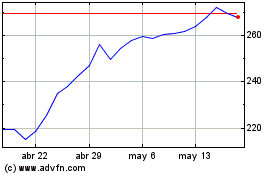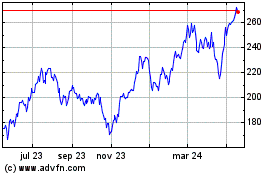A U.S.-China Trade War Would Reshape Tech Investment
20 Abril 2018 - 7:00AM
Noticias Dow Jones
By Dan Strumpf and Yoko Kubota
HONG KONG--Technology has emerged as the early battleground in
the U.S.-China trade dispute, triggering predictions of significant
changes in the global investment strategies of Chinese tech
companies.
Chinese companies will be more likely to invest in emerging
markets such as India and Southeast Asia, said Fan Bao, the
chairman and chief executive of investment bank China Renaissance
Partners.
In the current environment, Mr. Fan said, he foresees reduced
investment in the U.S. "The reality is, it's difficult to get
things done...given uncertainty around approval."
His comments came during The Wall Street Journal's two-day
D.Live Asia conference in Hong Kong, following a turbulent week for
the technology sector that saw regulators in the U.S. and China
taking aim at some of the biggest companies in the field.
Among the week's developments: Chinese regulators signaled a
rocky path ahead for the $44 billion attempted takeover by U.S.
chip maker Qualcomm Inc. of NXP Semiconductors NV. That came just
days after the U.S. Commerce Department slapped Chinese telecom
giant ZTE Corp. with a seven-year ban on buying U.S. products, a
move that ZTE said threatens its survival.
The moves have thrust technology companies onto the front lines
of an intensifying trade dispute between the U.S. and China. The
Trump administration has ratcheted up pressure on Beijing with
threatened tariffs on a total of $150 billion in Chinese imports,
and China has shot back with plans for tariffs of its own.
"I'm very concerned," Charles Li, chief executive at Hong Kong
Exchanges and Clearing Ltd., said Friday. "This is just inevitable
because you have a rising power and an existing incumbent power and
they've all sort of frictions--particularly when their political
and ideological systems are different."
As trade tensions escalate, some executives expressed concerns
about rising economic nationalism. Among them was Carlos Ghosn, the
chairman of the automotive alliance between Renault SA, Nissan
Motor Co. and Mitsubishi Motors Corp.
While Mr. Ghosn said he is worried, he also said he doesn't see
the dispute becoming a full-blown trade war. "I think it's more a
pressure to renegotiate deals" that the U.S. considered were not
too fair, he said.
Mr. Ghosn, referring to the renegotiations of the North American
Free Trade Agreement, said that for auto makers, knowing what the
trade rules are going to be in the future is more important than
the details of the rules. Car makers plan for 10 years down the
road when it comes to building plants or where and which vehicles
to make, and must know what the rules are going to be then to make
meaningful plans, he said.
"Being in a situation where one party is not happy with the deal
is very preoccupying," he said.
Among the reasons trade friction has increased is U.S.
accusations that China has been trying to steal U.S. technology
through unfair trade practices.
Chinese companies have an advantage in the tech face-off with
the U.S. in their deep set of data, said Ralph Haupter, Microsoft
Corp.'s corporate vice president. But they can face challenges
competing in multiple markets.
"If you look at AI, you need data; China has that. You need
talent; China has a lot of that," he said. "At the same time, all
of the companies which are building businesses in China, they
struggle because they either don't find a way to get out of the
domestic market or they go to the U.S. immediately."
Write to Dan Strumpf at daniel.strumpf@wsj.com and Yoko Kubota
at yoko.kubota@wsj.com
(END) Dow Jones Newswires
April 20, 2018 07:45 ET (11:45 GMT)
Copyright (c) 2018 Dow Jones & Company, Inc.
NXP Semiconductors NV (NASDAQ:NXPI)
Gráfica de Acción Histórica
De Jun 2024 a Jul 2024

NXP Semiconductors NV (NASDAQ:NXPI)
Gráfica de Acción Histórica
De Jul 2023 a Jul 2024
